
Fighting Asian hornets in Zernez
Have you discovered an Asian hornet's nest? We'll be on site quickly! Call now - Daily Mon-Sun 07:00-21:30. Contact us now: 058 510 22 54
Having the Asian hornet's nest removed
Vespa velutina, an Asian hornet species from South-East Asia, has aggressively established itself in Switzerland and the entire subcontinent. Despite its non-threatening behavior towards humans, it has earned a reputation as a predator of honey bees, causing alarm among beekeepers. Only a few of these hornets can swiftly launch an attack and wipe out a colony of bees within just a few hours. If you have discovered a hornet's nest on your house, patio, shed, or in your blind box, contact our experts for hornet nest removal in Zernez!
Use the uncomplicated telephone service of the Hornet experts in Zernez and simply inform us at 058 510 22 54, we will be on site quickly so that you and everyone in your area feel completely safe again.
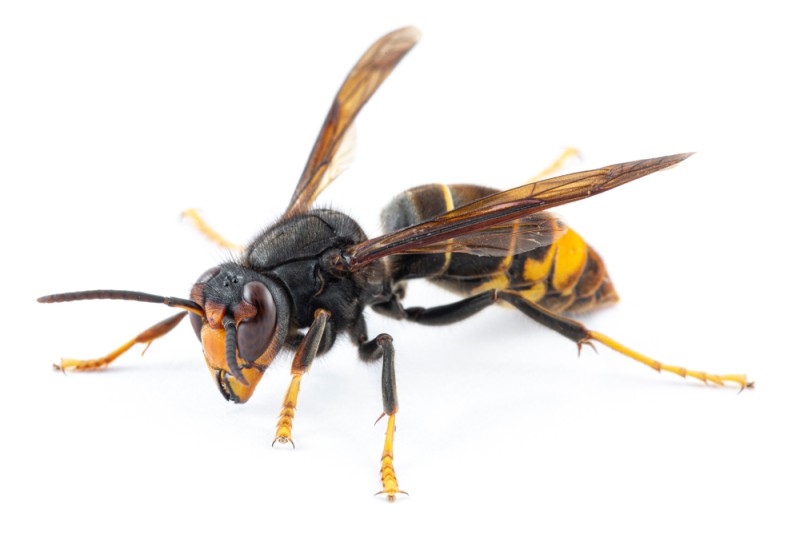

Appearance of the Asian hornet
Here are some characteristics that distinguish the Asian hornet:
1. Size: The queen can reach a length of about 3 cm, while the workers are slightly smaller and measure about 2.5 cm.
2. Color: The Asian hornet has a dark body that is almost black, with a yellow stripe at the back of the abdomen. Its face is orange-yellow.
3. Wings: The wings are dark and almost smoky gray.
4. Legs: The hornet has yellow tips on its legs, which is a striking distinguishing feature when it flies.
5. Nest: The Asian hornet's nest is often high in the trees, but it can also be found underground or in tall structures such as chimneys. It has an oval shape and is made of chewed wood, which gives the hornet a papery texture.
It is important to distinguish the Asian hornet from the European hornet (Vespa crabro), which is more harmless and a natural part of the European fauna. If you suspect you have found an Asian hornet nest near you in Zernez, you should report this to the local authorities, or using our reporting form, as they can spread quickly and be harmful to bees and other insects. To avoid being attacked by the flying inhabitants, you should hire a professional pest controller such as the Hornet Experts Zernez. We can identify the nest beyond doubt and take further steps to remove the Asian hornets professionally.
News about the Asian hornet in Zernez
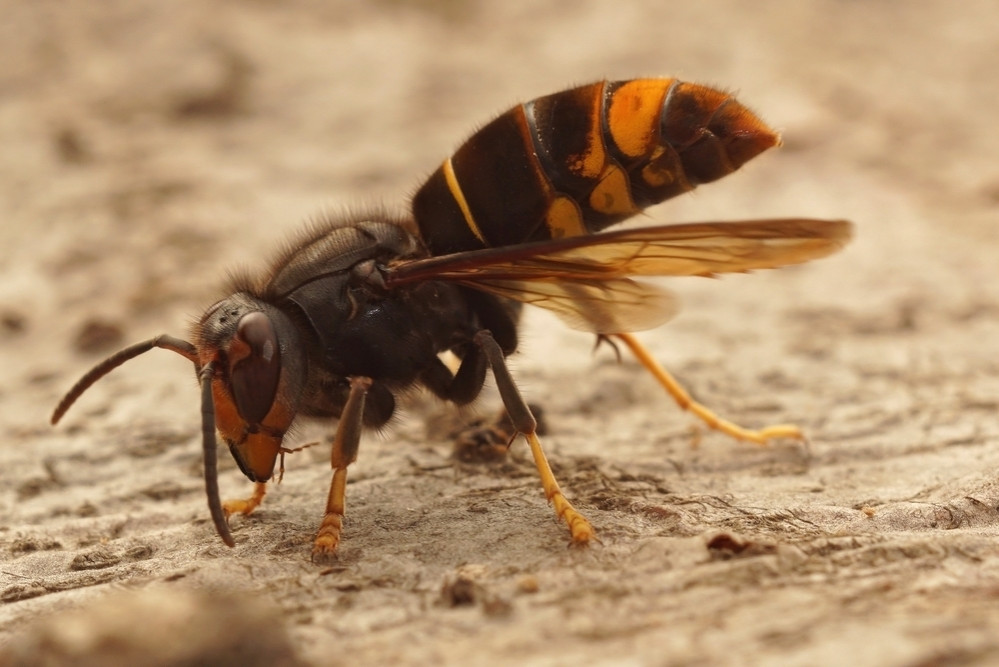
02.12.2025 Western Switzerland: Killer hornet eats bees
The territory of the Asian killer hornet has expanded considerably this year, with a notable increase reported in western Switzerland. This invasive species poses a significant threat to native bee populations, as bees make up the majority of its diet. The potential consequences are serious. Moreover, the hornet represents a danger to individuals with allergies to its venom.
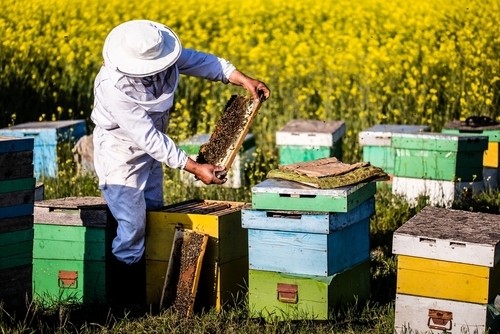
25.11.2025 Serious concerns about the bee population!
Asian hornets are inflicting significant harm on beehives across multiple parts of Europe, as reported by local beekeepers. Even a small number of hornets can destroy an entire bee colony within hours. This sharp decline in pollinators could have serious consequences for pollination, local ecosystems, and agricultural productivity.
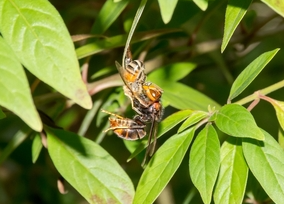
18.11.2025 Asian hornet doesn't just eat bees!
The danger it presents to insects is substantial!
The Asian hornet feeds largely on honeybees—up to 85 percent of its diet—alongside beetles and flies. This high level of predation not only poses difficulties for fruit growers but also further threatens already vulnerable bee populations.
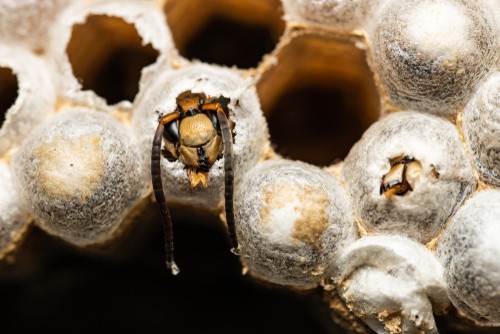
11.11.2025 How did the Asian hornet get to Europe?
The Asian hornet likely arrived in Europe unintentionally and has quickly expanded throughout France and nearby countries. Its adaptability to different environments and the absence of natural predators have contributed to its rapid spread. A single nest can generate several hundred new queens in one breeding season.
Asian Hornet Reporting Form
Please fill out all required fields and submit the form.
Help us!
If you discover an Asian hornet or a nest of this invasive species in Zernez, it is of the utmost importance that you report it immediately. The Asian hornet is not only dangerous to humans, but also poses a serious threat to native bee populations and the ecological balance in Switzerland.
Why is it important to report the find?
The Asian hornet, once established in certain areas, has a substantial effect on native insects, honey bees being one of the most affected species. By preying on bees, these hornets contribute to the decline in pollinator populations, which can have far-reaching consequences on the local flora and agricultural production. By reporting sightings, experts can react quickly, remove the hornets or their nests and thus prevent the spread of this invasive species.
Notification form for sightings
Protecting our native insect populations is crucial! To regulate the Asian hornet overpopulation in Switzerland effectively, we kindly request that you report any suspicions or sightings by utilizing our special reporting form. With your support, we can work together to intervene at an early stage and minimize the spread of this perilous species in our ecosystems.
Your contribution is crucial in the fight against the Asian hornet in Zernez. Together we can protect nature and maintain the balance of our ecosystems;
Thank you for your vigilant attention and your commitment to protecting our environment.
How dangerous is the Asian hornet?
The Asian hornet (Vespa velutina) is a predatory insect that originated in Asia and has spread in recent years to various parts of Europe, including France and now also Switzerland and in Zernez. Although it poses a threat to honey bees and native biodiversity, it is generally no more dangerous to humans than other wasp species. Nevertheless, there are some aspects to be aware of:
1. Threat to honey bees: The Asian hornet preys on honey bees, threatening native bee populations. A decline in bees can have a negative impact on pollination and thus on local flora and agricultural production.
2. Stings: As with other wasp and hornet species, the stings of the Asian hornet can also be painful. For most people, the stings are unpleasant but not dangerous. However, people who are allergic to wasp or hornet stings can suffer a severe allergic reaction, which in the worst case can lead to anaphylactic shock.
3. Aggressiveness: Although the Asian hornet is not necessarily more aggressive towards humans than other wasp species, it can become aggressive if it feels threatened, especially near its nest.
4. Ecological effects: Apart from the direct effects on honey bees, the spread of the Asian hornet can also disturb the ecological balance by affecting the populations of other insects.
Emphasizing the difference between the Asian hornet and the Asian giant hornet (*Vespa mandarinia*) is essential to prevent misunderstandings. The giant hornet, known as the "killer hornet," is significantly larger and possesses a more powerful venom, heightening the potential danger to humans.
If you have discovered a nest, call us immediately: 058 510 22 54
Our hornet professionals in Zernez are certified by the VSS.
Frequently Asked Questions About Asian Hornets in Zernez
The Asian hornet's stings are known to be dangerously severe, making it an insect of greater peril compared to most other hornet species.
Reaching an extraordinary length of about 3 cm, the Asian hornet is an impressive stinging insect. Its elongated black body is accentuated by vibrant orange, yellow, and black stripes, creating a visually captivating appearance.
Principally recognized for its bashfulness and placidity, the Asian hornet's behavior can drastically change when confronted or trapped. It transitions into a highly active and aggressively defensive state, intent on ensuring its protection.
It is of utmost importance for humans to be wary of the Asian hornet's strikingly poisonous attributes, as its bite can cause severe pain and provoke allergic reactions.
Caution is advised when dealing with the Asian hornet, as it is dangerous with its toxic sting. Its sting is notably more agonizing than that of other wasps and can trigger allergic reactions.
Reporting an Asian hornet sighting requires contacting a regional wild bee protection officer or getting in touch with the responsible department within the Ministry of Agriculture to ensure proper documentation.
To prevent attacks and mitigate the expansion of Asian hornets, reporting sightings is highly important. These insects are known for their territorial and aggressive demeanor, emphasizing the need for vigilance.
Managing the problem of Asian hornets in Switzerland requires professional hornet control measures. Therefore, it is recommended to contact a reputable pest control service for assistance.
The Asian hornet does not fall under protective regulations; thus, close monitoring of their populations is indispensable to inhibit their unchecked spread.
The Asian hornet retreats for hibernation, selecting either communal living or solitary seclusion, often taking shelter in the nooks of walls, buildings, garden sheds, makeshift structures, or tree hollows.
Would you like more information about Asian hornets? Then take a look at our FAQ's about Asian hornets.
Private inquiry form
For an uncomplicated request to remove an Asian hornet's nest, please use our contact form for private individuals.
Real estate inquiry form
Use our property management order form to request the removal of an Asian hornet's nest.




_8.jpeg)
_9.jpeg)
_8.jpeg)
_7.jpeg)